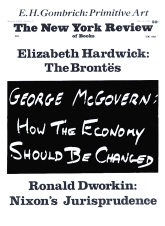In response to:
The Disenchantment of the World from the December 2, 1971 issue
To the Editors:
Recently a review of some works on witchcraft appeared in The New York Review of Books: Lawrence Stone, “The Disenchantment of the World” (December 2, 1971). To someone unread in this literature and the current understandings, Stone’s review sheds some light. But his virtually scurrilous attack on Trevor-Roper is simply untenable. Geographic factors, for example—which Stone dismissed pre-emptively—are very much alive even today in France (cf. F. Boulard, in L. Schneider, Religion, Society, and Culture, 1964).
Secondly, if Stone intends to deploy some form of psychology in explaining the prevalence of witchcraft, then among the psychological forces which must be counted as irritants to social relations are family jealousies, sexual rivalries, delusions, obsessions, and other forms of unconscious aggressive impulses. The focusing on the beggar-benefactor relationship as the central theme and locus of changing social relations generating new conflicts is too simple-minded and far too great of a reduction to allow explanation of the many varieties of witchcraft behavior in Europe in the past. Furthermore, all of these psychological involvements were known and written about earlier, e.g., G. Rosen, Madness in Society (1968), the year after which Stone places the publication of Trevor-Roper’s allegedly out-dated work. One should also note that the influence of Trevor-Roper is to be found in Rosen’s account.
And as for the church’s involvement in the witchcraft craze, from the thirteenth century onward, Stone cannot write it off simply by charging Trevor-Roper with anti-clericalism. The monumental work of H. C. Lea, as well as other continental scholars, still stands behind Trevor-Roper’s sensitivity to the critical role that perhaps misguided clerics had in persecuting witches. But even if the church did at one time excite public curiosity in the evils of witchcraft, that is not good reason for believing that it could not at a later time—and place, the United States, to which Stone repairs for support for his argument—attempt to halt the persecution of alleged witches. As for that matter, Lea tells us of clerics during the waning of the Middle Ages who had such acumen of perception as to recognize many tales of witchery as delusion and phantasy.
Toby E. Huff
Department of Sociology
Southeastern Massachusetts University
North Dartmouth, Massachusetts
Lawrence Stone replies:
I am very surprised that Professor Huff considers that my carefully balanced criticisms of Trevor-Roper’s theories were “virtually scurrilous.” I feel sure that Trevor-Roper himself, who knows what scurrility is, can make finer distinctions.
I will reply to Professor Huff’s points seriatim:
-
I did not dismiss geographical factors—it would be idiotic to do so—but rather Trevor-Roper’s simplistic association of witchcraft with mountains: “The thin air of the mountains breeds hallucinations.”
-
As for my emphasis on the beggar-benefactor relationship, I specifically objected to “the stress laid by Mr. Thomas on rising tensions in the alms-giver/alms-seeker relationship as the factor in stimulating recourse to witchcraft in the village community.”
-
I did not write off clerical involvement by accusing Trevor-Roper of anti-clericalism, for I spoke about the full-blown witchcraft theory as “an invention of obsessed priests and intellectuals.” But I did point out the fact, now well known to historians if not to sociologists, that the vast bulk of witchcraft accusations emerged from complaints of neighbors, not investigations of clergy. Belief in witchcraft and magic was part of the popular culture long before the clergy began to intellectualize about it.
-
Lea is indeed the main well from which Trevor-Roper drew his source material. Recent historians like Thomas, Macfarlane, and Monter have gone to work in the archives—which Trevor-Roper has not—have probed beyond Lea into the legal records of the age, and have come up with some rather different conclusions. Perhaps Professor Huff should read them. Come to that, perhaps he should read me more carefully too.
This Issue
May 4, 1972



